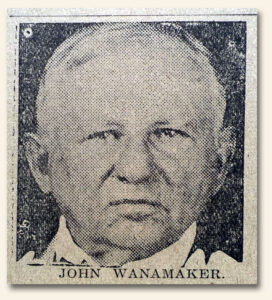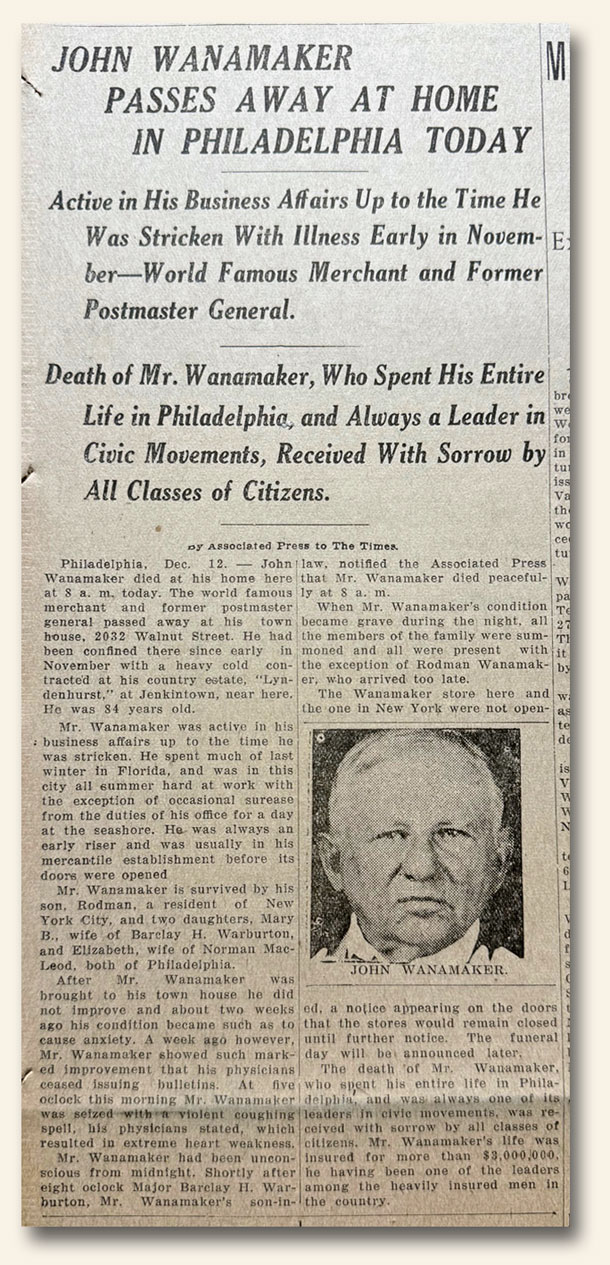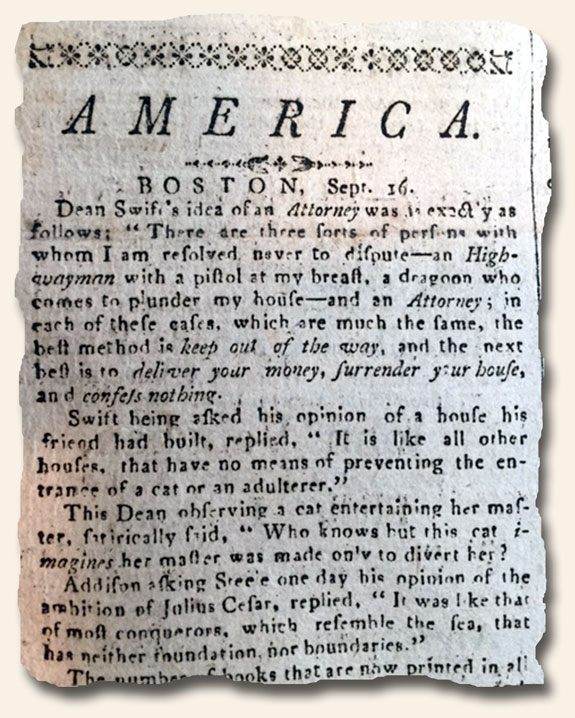Who’s Who in Newspapers – John Wanamaker edition
November 10, 2025 by GuyHeilenman · 1 Comment
Typically, our “Who’s Who in Newspapers” series highlights individuals who were unfamiliar to me before I delved into the world of Rare & Early Newspapers. Today’s post is a departure from that norm. While reviewing the December 12, 1922, issue of The Bethlehem Times, I came across a front-page report of John Wanamaker’s passing. The article stirred a flood of childhood memories tied to this remarkable man whose legacy left a lasting impression on me. Eager to share his story, I hope the following introduction sheds light on his extraordinary contributions.
John Wanamaker: The Merchant Who Made Shopping an Experience
 From personal memories to retail innovation, Wanamaker’s left a legacy that reshaped both commerce and tradition. Every December starting in the mid-1950s, my parents bundled up my siblings and me for a trip into Philadelphia to see the Christmas light and music show at Wanamaker’s (currently being converted into a mixed-use facility). To us, it was pure magic — thousands of twinkling lights, the sound of the great pipe organ, and crowds of families gathered in awe. With my grandmother working in the store during those years, Wanamaker’s always felt like more than a department store — it felt like part of our family’s story.
From personal memories to retail innovation, Wanamaker’s left a legacy that reshaped both commerce and tradition. Every December starting in the mid-1950s, my parents bundled up my siblings and me for a trip into Philadelphia to see the Christmas light and music show at Wanamaker’s (currently being converted into a mixed-use facility). To us, it was pure magic — thousands of twinkling lights, the sound of the great pipe organ, and crowds of families gathered in awe. With my grandmother working in the store during those years, Wanamaker’s always felt like more than a department store — it felt like part of our family’s story.
That sense of wonder was no accident. John Wanamaker (1838–1922), the man behind the store, believed shopping could be more than a transaction — it could be an experience. When he opened his Philadelphia department store in 1876, it quickly became a model for modern retail. Wanamaker pioneered the one-price system (no haggling), introduced the money-back guarantee, and used newspaper advertising on a scale few had seen before.
He also reshaped how Americans paid for what they bought. Realizing that many working families couldn’t afford to pay cash for larger purchases, Wanamaker offered installment plans and charge accounts. This bold move laid the foundation for consumer credit, opening the door for more households to access quality goods.
Beyond retail, Wanamaker served as U.S. Postmaster General under President Benjamin Harrison, introducing commemorative stamps and expanding rural mail delivery. Yet it was his Philadelphia store — both marketplace and civic landmark — that became his greatest legacy.
Even today, the memory of standing with my siblings beneath the glow of the light show while the Wanamaker organ thundered through the Grand Court remains a vivid reminder of how one man’s vision reshaped not just shopping, but tradition itself.
Wanamaker’s Firsts – Innovations that reshaped retail
- One-Price System – Ended the practice of haggling; everyone paid the same fair price.
- Money-Back Guarantee – Built customer trust and loyalty.
- Large-Scale Advertising – One of the first to use newspapers to reach wide audiences.
- Department Store Experience – Turned shopping into a cultural outing with art, music, and public events.
- Consumer Credit – Introduced installment plans and charge accounts, paving the way for modern credit.

I’m New Here: Weeks Twenty & Twenty-One…
July 4, 2019 by Stephanie Williams · Leave a Comment
It’s hard to put into words all I learned last week, other than conclude (again) I work in an amazing place. Distinct events blurred together as we completed the regular tasks of a pre-catalog release week, simultaneous with the receipt of eleven pallets of a new title.
As I know the least, I am the least helpful in this bulk intake process. Everyone else has done it before – making space where none seems apparent. So I stayed out of the way, fielding phone, email and web orders to the best of my ability.
 This week, however, marks the Fourth of the July, and I took the opportunity to look at some surrounding details of 1776 through the real time lens of reported news.
This week, however, marks the Fourth of the July, and I took the opportunity to look at some surrounding details of 1776 through the real time lens of reported news.
The Sons of Liberty met under the Liberty Tree. It’s not an American fable; I read the notice calling for attendance and providing an alternate location in case of overflowing turnout. People staked fortune and life to sign the Declaration of Independence, and Philadelphia papers published their names alongside that document. Paul Revere was a working man who bought advertisements in The Massachusetts Centinel to draw more customers into his silver shop. Somehow, the risk of this bid for colonial freedom becomes more meaningful as I consider the sacrificial participation required from everyday people who had plenty to occupy them in their own private lives. Regular folks became significant because they stepped up when there was every reason to keep their heads down.
Today I am thinking about the farmers and shopkeepers, the printers and the writers who looked beyond immediate concerns to take a stand for the implications on centuries to come. Surely these are some for whom the words resounded, “When in the course of human events it becomes necessary…” I won’t pontificate aloud, but there are so many contrasts to the perspective I readily adopt within my plush and easy American life.
Fresh perspective on the human story feeds the impulse: the more I find out, the more I want to know. But the disconcerting truth is that the more I search, the more versions I find. The best course of action just might be to head back into the annals and read it for myself…
The Traveler… the loss of a first…
July 17, 2017 by The Traveler · Leave a Comment
I traveled today to Philadelphia, Pennsylvania, by the means of The Pennsylvania Gazette of July 16, 1767. Within the issue I found the report  about the death of the first child ever born in Philadelphia. “At Kennet, in Chester County, the 5th Instant, died JOHN KEY, in the 85th Year of his Age, and the next Day was interred in the Burial Place belonging to the People called Quakers, in the Township, attended by a large Number of reputable People, his Neighbours, and Acquaintance, —- He was born in a Cave, long afterwards known by the Name of Penny-Pot, near Race-street, and WILLIAM PENN, our first Proprietor, gave him a Lot of Ground, as a Compliment on his being the first Child born in this City… His Constitution was very healthy till about 80, when he was seized with the Palsy, and continued weakly till his Death, —- About 6 Years ago he walked on Foot from Kennet to Philadelphia in one Day, which is near 30 Miles…”
about the death of the first child ever born in Philadelphia. “At Kennet, in Chester County, the 5th Instant, died JOHN KEY, in the 85th Year of his Age, and the next Day was interred in the Burial Place belonging to the People called Quakers, in the Township, attended by a large Number of reputable People, his Neighbours, and Acquaintance, —- He was born in a Cave, long afterwards known by the Name of Penny-Pot, near Race-street, and WILLIAM PENN, our first Proprietor, gave him a Lot of Ground, as a Compliment on his being the first Child born in this City… His Constitution was very healthy till about 80, when he was seized with the Palsy, and continued weakly till his Death, —- About 6 Years ago he walked on Foot from Kennet to Philadelphia in one Day, which is near 30 Miles…”
He sounded like a very remarkable man.
~The Traveler
The Traveler… William Penn’s estate…
May 15, 2017 by The Traveler · Leave a Comment
Yesterday I journeyed to Philadelphia, Pennsylvania through The Pennsylvania Gazette dated May 14, 1767. On the front page of the “Supplement to the Pennsylvania Gazette” which is entirely taken up with advertisements is for sale “…The Manor of Pennsbury, in Bucks County, containing about 6000 acres of land…one of the most valuable tracts that is now for sale in America…” with various details. This was the home estate of William Penn, now being sold for Ann Penn.
~The Traveler
Chuckle for the day…
June 9, 2016 by TimHughes · Leave a Comment
The “Pennsylvania Packet“, Philadelphia, issue of September 24, 1788 contains on page 3: “Dean Swift’s idea of an attorney…”. You can read it for yourself (see below).
Living in the moment…
April 28, 2014 by TimHughes · Leave a Comment
 One of the joys of reading newspapers of a bygone era is the opportunity to put yourself in a very special moment in history. One fine example is the report in the August 22, 1776 issue of “The Continental Journal” from Boston, which notes that: “…immediately after divine worship, the Declaration of Independence was read by Col. St. Clair, and having said, ‘God save the free independent States of America!’ the army manifested their joy with three cheers. It was remarkably pleasing to see the spirit of the soldiers so raised after all their calamities, the language of every man’s countenance was, now we are a people! we have a name among the states of this world.“
One of the joys of reading newspapers of a bygone era is the opportunity to put yourself in a very special moment in history. One fine example is the report in the August 22, 1776 issue of “The Continental Journal” from Boston, which notes that: “…immediately after divine worship, the Declaration of Independence was read by Col. St. Clair, and having said, ‘God save the free independent States of America!’ the army manifested their joy with three cheers. It was remarkably pleasing to see the spirit of the soldiers so raised after all their calamities, the language of every man’s countenance was, now we are a people! we have a name among the states of this world.“
Such editorial commentary brings the excitement of the period to life. This is truly the way to enjoy history–what a wonderful hobby!
Trenton as the nation’s capital in 1799…
September 13, 2013 by TimHughes · 2 Comments
A small news bit inconspicuously located on page 2 of the “Columbian Centinel” newspaper from Boston, dated October 19, 1799, struck me as being in error: “The President of the United States arrived at the seat of government, (Trenton) in good health.” Or so I thought.  While history tells us that the seat of government had moved from New York to Philadelphia to Washington, D.C. during this period, it appears in fact that the federal government did remove itself from Philadelphia (to Trenton) for a brief time in 1799 to escape the Yellow Fever epidemic in that city. But to my surprise there is very little on the internet about it. There are several sites which provide some detail about Trenton being the nation’s capital for 54 days in 1784, but just two sites have a passing reference to the 1799 event. There is no mention as to exactly when or for how long. Can anyone provide more detail? Surprisingly even the sites of the city of Trenton offer no help.
While history tells us that the seat of government had moved from New York to Philadelphia to Washington, D.C. during this period, it appears in fact that the federal government did remove itself from Philadelphia (to Trenton) for a brief time in 1799 to escape the Yellow Fever epidemic in that city. But to my surprise there is very little on the internet about it. There are several sites which provide some detail about Trenton being the nation’s capital for 54 days in 1784, but just two sites have a passing reference to the 1799 event. There is no mention as to exactly when or for how long. Can anyone provide more detail? Surprisingly even the sites of the city of Trenton offer no help.
The Traveler… USS Constitution defeats HMS Java… River Raisin…
February 18, 2013 by The Traveler · Leave a Comment
 This week I traveled to Philadelphia, Pennsylvania, by way of the Aurora dated February 19, 1813. Here I found the report of “Another Naval Victory!” being reported “… On the 29th of December, off St. Salvadore, the Constitution, capt. Bainbridge, fell in with the British frigate Java, of 38 guns (mounting 49) and 400 men. After an action of one hour and forty-five minutes, the Java struck, with the loss of 60 killed and 170 wounded. The Constitution had 9 killed and 25 wounded… The Java was so much damaged in action, that it was deemed impossible to fetch her in, and by order of captain Bainbridge she was burnt…”.
This week I traveled to Philadelphia, Pennsylvania, by way of the Aurora dated February 19, 1813. Here I found the report of “Another Naval Victory!” being reported “… On the 29th of December, off St. Salvadore, the Constitution, capt. Bainbridge, fell in with the British frigate Java, of 38 guns (mounting 49) and 400 men. After an action of one hour and forty-five minutes, the Java struck, with the loss of 60 killed and 170 wounded. The Constitution had 9 killed and 25 wounded… The Java was so much damaged in action, that it was deemed impossible to fetch her in, and by order of captain Bainbridge she was burnt…”.
Also in this issue was the report of the battle at river Raisin, including the killing (scalping) of General Winchester and the further mutilation of his body. It is so hard to imagine what they went through in those battles. So much for nostalgia.
~The Traveler
Reflecting on a Day of Thanksgiving & Prayer from 1776…
November 22, 2012 by GuyHeilenman · Leave a Comment
On this (American) day of thanksgiving, it seems appropriate to reflect on such a day from the past through the eyes of those who were embarking on what may have been the most historic event in U.S. history – July 4, 1776. A special thanks is in order for our friends in Scotland who captured this significant moment on the pages of the Edinburgh Evening Courant, dated September 2, 1776. Please enjoy:
Constitution for the “Philadelphia Dueling Club”…
July 13, 2012 by TimHughes · Leave a Comment
“The Courier” newspaper of Norwich, Connecticut has in its July 2, 1800 edition an apparently tongue-in-cheek report detailing the constitution for the “Philadelphia Dueling Club”. The fact that it was approved on May 32, 1800, and signed by “William Blood, President’ and “Charles Bullet, Secretary” seems to render this less than real, the content is nonetheless interesting reading.
Its preamble notes that dueling has become: “…the fashion to the infinite satisfaction of all men of true honor, & whereas the opinion that this practice is improper & Immoral being only held by old women, or men who ought to wear petticoats…” with more. See the photo for the full 1st article… and the link above for the full text.




